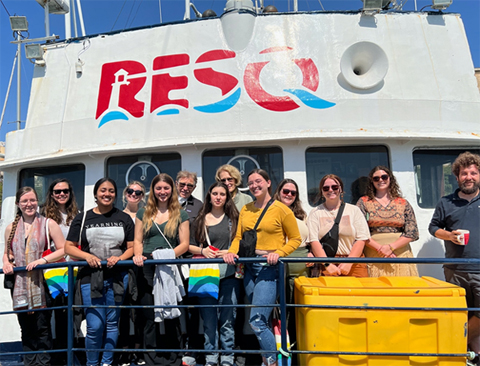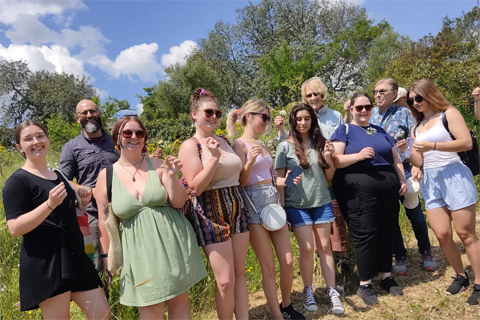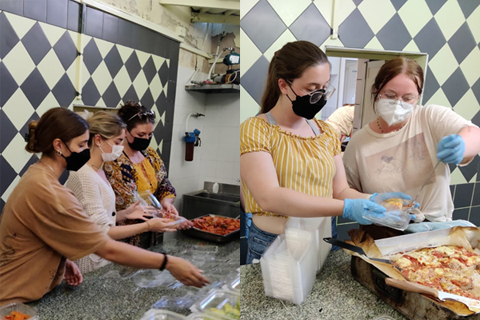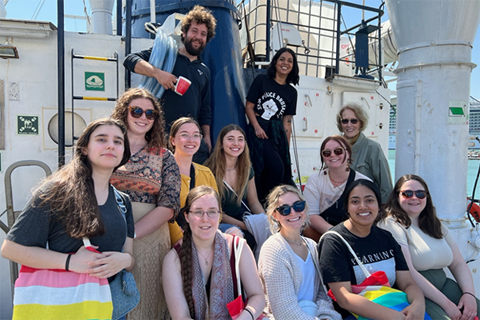
Aboard the RESQ, from left, Liza Gildermeister, Consuelo Cannuscio (on-site coordinator), Ciara Miller, Lauren Hayes, Sydnie Kilgour, Dr. David Bell, Maya Roth-Wadsworth, Dr. Theresa Moran, Emily Jones, Faith Laughlin, Emily McCarty, Jackie Augustine, and a RESQ volunteer crew member.
Ohio University students studying abroad in Sicily this summer saw firsthand how service organizations can tackle big problems — such as immigrants in danger of drowning, prisoners reentering society, and increasing numbers of food insecure people — by addressing individual needs at the hands-on level.
To learn about volunteer and social activities, all with a connection to food, the students went aboard a boat called the RESQ, toured a farm that provides integration pathways for prisoners, and volunteered preparing meals at a local church kitchen on the largest island in the Mediterranean.
“When I saw the RESQ boat docked in the port of Ortigia, I immediately rushed over!” said Theresa Moran, co-director of the Italy: Food in Sicily study away program. “This is one of the vessels that goes out to rescue migrants in small boats and rafts who attempt the perilous journey from the Libyan coast across the Mediterranean, hoping to reach the European Union by getting to Italy. Many thousands drown on the way. Luckily, there was a crew member on deck, and I was able to arrange a visit for the students the following day.”
The non-profit organization, RESQ People Saving People, was established in 2019 with one goal—to protect life and human rights in the central Mediterranean Sea. Since 2014, more than 20,000 men, women, and children fleeing war, civil strife, famine and poverty have perished trying to cross the Mediterranean to enter the European Union. The RESQ vessel is a 300-ton search and rescue ship with a crew of 20 people, including maritime professionals and specialized volunteers as doctors and nurses, rescuers, cultural mediators, a logistician and a cook. On board there is also a small medical clinic and separate accommodations for women and children.
Food in Sicily students toured the ship, met with the captain and volunteers, and watched videos of the ship’s rescue missions. In the small galley kitchen, the students learned about the challenges of feeding the often desperately hungry survivors of diverse ages, religions, and nationalities. The RESQ cooks most often prepare a vegetable couscous as it is the culturally appropriate food choice for the rescued migrants.
Students learned that maritime law requires that all ships at sea, upon receiving an SOS signal from any source that a ship or survival craft is in distress, must proceed with all speed to the assistance of the persons in distress. Cruise ships have been known to change their routes so as to avoid those parts of the Mediterranean where they might receive an SOS message.
“It’s impressive the amount of good the RESQ people can do using their boat,” said exercise physiology major Jackie Augustine, “and equally saddening thinking about what could be done using a bigger boat that doesn’t want to ‘ruin’ someone’s vacation time. I am so blessed to have spent some time hearing about the mission and compassion of the crew members of the RESQ boat.”
Since August 2021, the ship has saved more than 225 lives. The students left the ship with a deep appreciation for the often-harrowing humanitarian work that the crew and volunteers undertake.

Food in Sicily students and faculty holding Dolci Evasioni products with members of the social cooperative L’Arcolaio in the foreground.
Later in the program, which ran May 6 through May 26, students visited the social enterprise cooperative L’Arcolaio. L’Arcolaio, or the spinning wheel, was founded in 2003 with the goal of creating social and employment integration pathways for prisoners to reenter civil society following release from incarceration. At the facility in a nearby prison, L’Arcolaio staff guide the incarcerated in the production of traditional Sicilian food items, using local, organic ingredients.
The social enterprise has expanded to include another facility on its farm property in order to assist other disadvantaged groups such as recently arrived migrants, especially women, while promoting a general and wider commitment to the area and the environment by respecting and promoting the region and its traditions.

Food in Sicily students and faculty and cooperative member sampling the rosemary at L’Arcolaio’s growing facility in the Iblei Mountains. Lush Retail, Ltd, the British cosmetics giant, purchases L’Arcolaio’s rosemary harvest.
“In previous years,” Moran said, “we have visited their facility where they package their dessert products — almond macaroons, chocolate covered candied fruit, roasted almonds, carob syrup, and many other products which are made in the Cavadonna prison bakery. These products are sold under the L’Arcolaio brand name Dolci Evasioni, which appropriately means sweet evasions or escapes. But this year, we visited their farm facility, where they have olive and almond groves and grow herbs like oregano, rosemary, lavender, thyme, sage, and wild fennel. It’s such a beautiful, wild part of the Iblei Mountains.”
Thanks to this social enterprise, dozens of prisoners and other disadvantaged people have been supported and, through their work, have been able to feel part of society again, to “escape” their past, and to gain a future of employment and dignity.

Helping in the kitchens of Caritas, from left: Sydnie KIlgour, Lauren Hayes, Jackie Augustine, Emily Jones and Emily McCarty
Finally, students got the chance to do their own service work by helping in the kitchens of Caritas in Ortigia. Every iteration since 2016, Food in Sicily students have been helping prepare meals for those in need at a local church kitchen near the students’ program accommodations. Caritas is an organization of the Catholic Church that serves the poor and promotes charity and justice. With the rise in migrants and the increasing numbers of food insecurity people, volunteering to prepare meals for Caritas is one of the most popular ways that Italians serve their communities.
Students helped in the kitchens preparing food and making up food parcels. In pre-Covid days, along with helping to chop and cook, students would also serve the needy at tables. Now, meals are packed with fresh fruit and bottled water and handed out by the volunteers.
“This service-learning work is an apt reminder for students and faculty that a world of need and suffering exists right next to our exciting world of study away. It is essential to always remember this world of need and to strive to give back to it,” said Moran, who is an adjunct associate professor of instruction in Environmental and Plant Biology and co-directed the program with David Bell, chair and associate professor of Linguistics, both in the College of Arts and Sciences at Ohio University.




















Comments